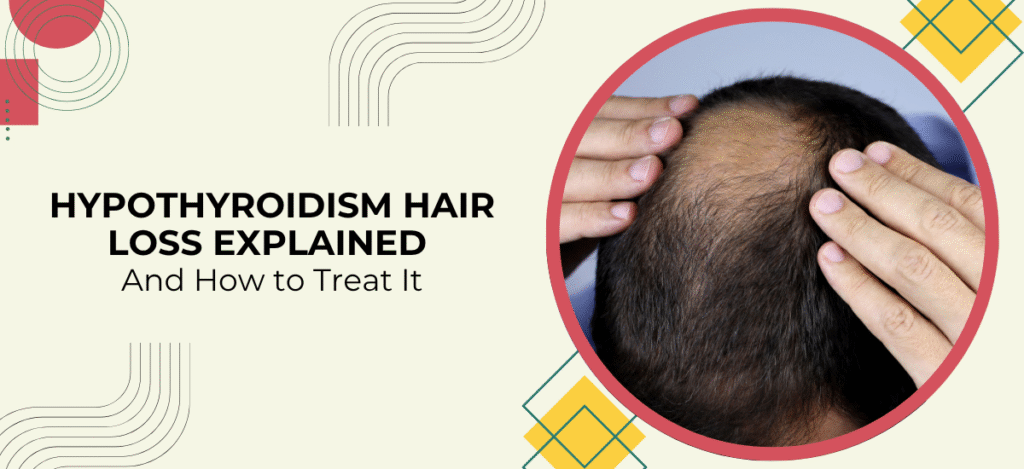Introduction
Ever run your fingers through your hair and notice way too many strands coming out? It’s alarming—especially when it seems to happen out of nowhere.
If you’ve been diagnosed with hypothyroidism, or even if you just suspect your thyroid isn’t working right, that hair loss might not be random. In fact, it’s one of the most common and frustrating symptoms.
Let’s talk about why it happens, what it feels like (yes, the emotional part too), and how you can get your hair back on track—without falling down a rabbit hole of miracle cures.
Can High Hypothyroidism Cause Hair Loss?
Absolutely. When your thyroid slows down, so does your hair’s growth cycle. It’s like your body hits pause on anything non-essential—including shiny, healthy strands.
How Hypothyroidism Affects Hair
Here’s the thing: thyroid hormones (T3 and T4) are kind of the unsung heroes of your body. They regulate everything from how fast your heart beats to how your hair grows.
So when your thyroid gets sluggish (that’s hypothyroidism), it messes with the natural rhythm of your hair follicles. Instead of staying in the growth phase, they check out early and enter the resting phase—also known as telogen. The result? More hair on your pillow, in your brush, and down the drain.
A lot of people describe the experience like this: your hair starts to feel thinner, especially at the part line. Some notice their eyebrows—especially the outer edges—start to disappear. That’s one of the lesser-known signs of thyroid-related hair issues, but it’s pretty classic in hypothyroidism.
What makes it worse? Thyroid hormone imbalance effects often come bundled with things like fatigue, dry skin, and depression—so hair loss can feel like the last straw.
Does Hair Loss from Hypothyroidism Grow Back?
Here’s the hopeful part: yes, it can. And often, it does.
Once you start proper thyroid treatment and your hormone levels are where they should be, the hair follicles slowly get the signal to restart. That said, hair doesn’t grow back overnight. It can take anywhere from 3 to 6 months just to see early signs of regrowth—and up to a year for things to feel “normal” again.
But if you’re still losing hair months into treatment? It might be more than just your thyroid. A lot of people with hypothyroidism also deal with nutritional deficiencies and hair loss. Low levels of iron, vitamin D, selenium, and biotin are especially common. And yes, they can stall hair regrowth no matter how perfect your thyroid levels are.
How Do You Treat Hypothyroid Hair Loss?
Let’s be real: this isn’t something you fix with just one pill or a magic shampoo. But there is a path forward—and it’s surprisingly doable when you break it down.
Start with thyroid meds. Levothyroxine is usually prescribed to get your hormone levels back on track. For most people, that’s the foundation. Without it, nothing else really works.
Next, look at your nutrition. A blood test can tell you if you’re missing key nutrients. If your iron or vitamin D is low, for example, your hair just won’t grow—no matter how much biotin you’re taking. That’s why effective treatments for thyroid-induced hair loss almost always include a dietary component.
Then there’s lifestyle. Are you sleeping enough? Managing stress? Moving your body a little each day? As a certified yoga trainer, Dr. Ayush Chandra often helps patients combine medication with holistic tools like breathwork and meditation. These aren’t just “nice extras”—they lower cortisol, which in turn supports better thyroid function.
Lastly, be kind to your hair. Skip the tight ponytails, harsh dyes, and heat tools. Think of your scalp like a garden—it needs time, nutrients, and gentle care to grow something beautiful.
When to Consult a Doctor
Hair sheds every day. That’s normal. But if you’re noticing handfuls coming out, or if your part is getting wider by the week, it’s time to dig deeper.
You’ll especially want to see a doctor if:
- You’ve been on thyroid meds for months with no improvement
- You’re experiencing other symptoms like brain fog, fatigue, or weight gain
- You’ve tried every oil, serum, and supplement—and nothing’s working
Dr. Ayush Chandra, a respected Diabetologist in Ghaziabad, takes a 360-degree approach. He doesn’t just look at your TSH levels. He evaluates everything from iron and B12 to stress and lifestyle—because hair loss is rarely just one thing.
FAQs
Q1. What are the signs of thyroid-related hair loss?
Hair thinning at the crown or temples, dry or brittle strands, and thinning eyebrows—especially the outer third.
Q2. How long before hair grows back after starting thyroid medication?
Usually, you’ll start seeing signs within 3–6 months. Full regrowth might take closer to a year.
Q3. Can I treat thyroid hair loss with just supplements?
Supplements help—but only if you need them. Without hormone correction, vitamins alone won’t fix the root problem.
Q4. Is the hair loss permanent?
Nope—not usually. If caught early and treated well, your hair can absolutely come back.
Q5. What’s the best diet for thyroid-related hair loss?
Focus on iron-rich foods, healthy fats, leafy greens, eggs, nuts, and plenty of hydration. Protein is key too—hair is made of it!
References:
- Healthline – Thyroid and Hair Loss
👉 https://www.healthline.com/health/thyroid-and-hair-loss - British Thyroid Foundation – Hair Loss and Thyroid Disorders
👉 https://www.btf-thyroid.org/hair-loss-and-thyroid-disorders
Disclaimer: This article is for educational purposes and should not be considered a substitute for professional medical advice. Always speak with a healthcare provider about your specific concerns.


